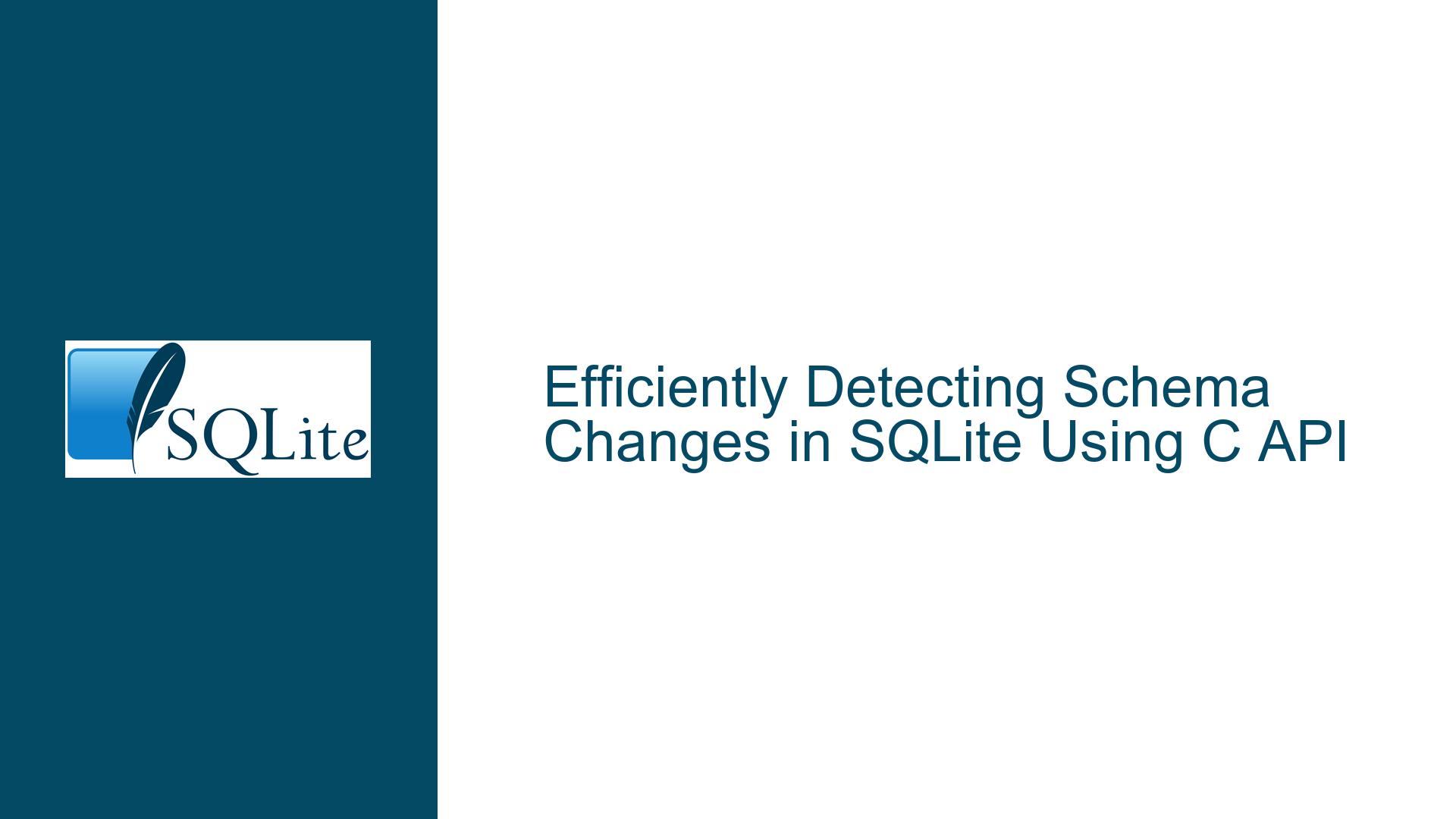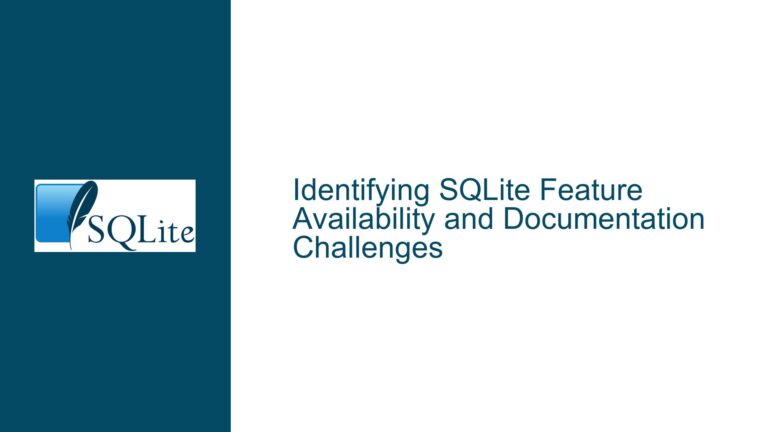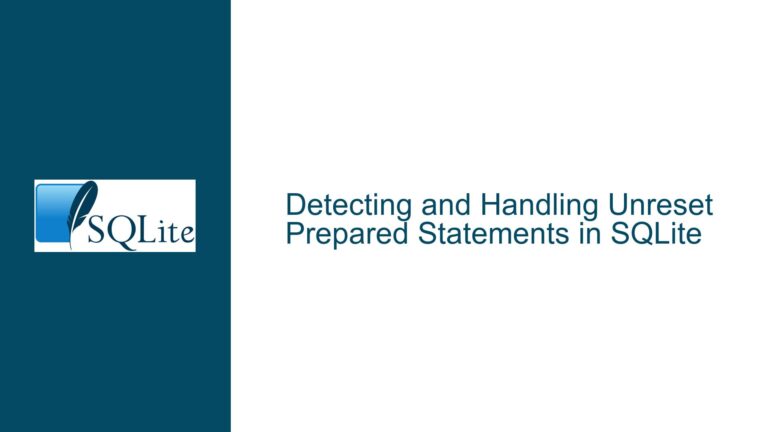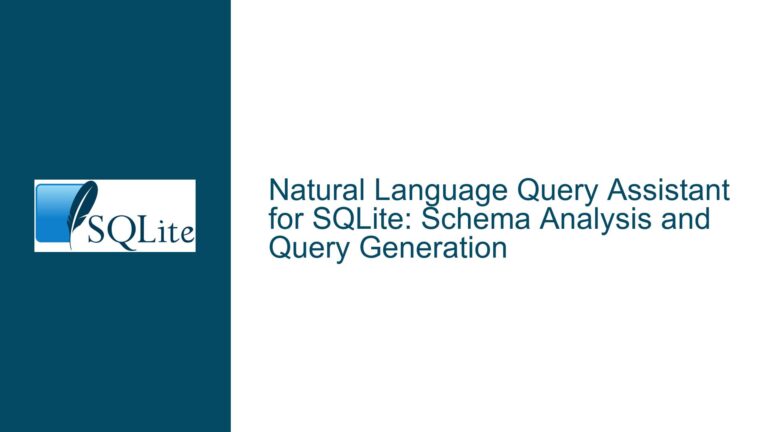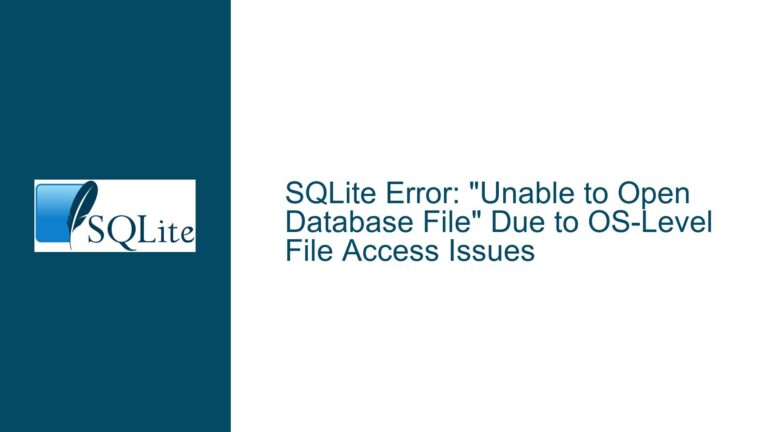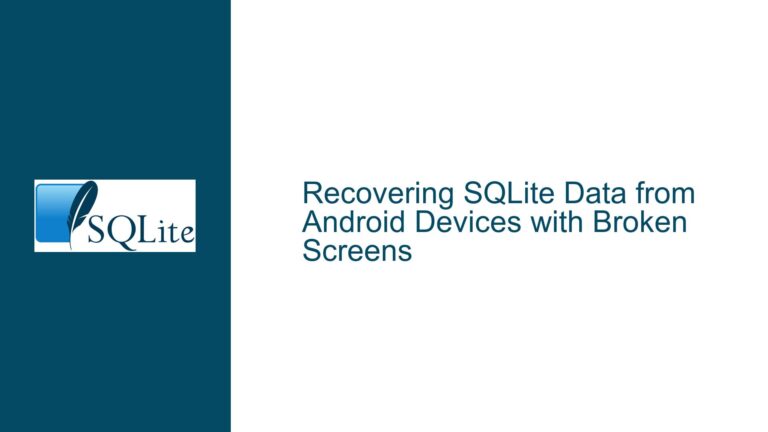Efficiently Detecting Schema Changes in SQLite Using C API
Understanding the Need for Schema Version Tracking in SQLite Applications
In modern database-driven applications, particularly those leveraging SQLite, the ability to detect schema changes efficiently is crucial. The schema version, represented by a 4-byte integer, is a fundamental aspect of SQLite’s internal management. It increments whenever a schema-altering operation, such as CREATE, ALTER, or DROP, is executed. For applications that interact with dynamically changing databases, especially those generated by external programs, tracking these changes is essential to maintain data integrity and optimize performance.
The current method to retrieve the schema version involves executing the PRAGMA schema_version; statement. While this approach is straightforward in the SQLite console, it becomes cumbersome in applications using the SQLite C API. The process requires creating and preparing a statement, binding parameters, stepping through the execution, and parsing the result. This sequence of operations is inefficient, especially when the schema version is already available in memory within the SQLite library.
The inefficiency is particularly pronounced in applications that cache schema-related information, such as table and column metadata, to avoid repeated queries. When the schema changes, these cached values become invalid, necessitating a mechanism to detect such changes promptly. The absence of a direct C API function to access the schema version or detect schema changes forces developers to rely on the PRAGMA statement, which incurs unnecessary overhead.
Exploring the Limitations of Current Schema Version Retrieval Methods
The primary limitation of using PRAGMA schema_version; in the C API is its reliance on the SQL execution pipeline. This pipeline involves several steps: statement preparation, execution, and result retrieval. Each step introduces latency, making the process suboptimal for frequent schema version checks. Moreover, the PRAGMA statement is designed for interactive use, not for programmatic access, which exacerbates the inefficiency.
Another limitation is the lack of a direct mechanism to detect schema changes without comparing the current schema version to a previously stored value. This comparison requires additional logic and state management in the application, further complicating the codebase. The absence of a dedicated function to check for schema changes means that developers must implement custom solutions, which can be error-prone and difficult to maintain.
The proposed functions, sqlite3_schema_version() and sqlite3_schema_changed(), aim to address these limitations by providing direct access to the schema version and a boolean indicator of schema changes, respectively. These functions would eliminate the need for the PRAGMA statement and its associated overhead, offering a more efficient and developer-friendly solution.
Implementing Efficient Schema Change Detection in SQLite Applications
To implement efficient schema change detection in SQLite applications, developers can adopt several strategies. The first strategy involves extending the SQLite C API with the proposed functions, sqlite3_schema_version() and sqlite3_schema_changed(). These functions would provide direct access to the schema version and a boolean indicator of schema changes, respectively, without the need for the PRAGMA statement.
The sqlite3_schema_version() function would return the current schema version as a 4-byte integer, allowing applications to compare it with a previously stored value to detect changes. This approach eliminates the overhead associated with the PRAGMA statement, providing a more efficient solution for schema version tracking.
The sqlite3_schema_changed() function would return a boolean value indicating whether the schema has changed as a result of the last executed statement. This function would be particularly useful for applications that need to invalidate cached schema-related information promptly. By providing a direct indicator of schema changes, this function would simplify the logic required to manage cached data, reducing the risk of errors and improving performance.
In addition to extending the C API, developers can optimize their applications by minimizing the frequency of schema version checks. Instead of checking the schema version after every statement execution, applications can check it only when necessary, such as after executing schema-altering statements or at specific intervals. This approach reduces the overhead associated with schema version tracking, further improving performance.
Another optimization strategy involves leveraging SQLite’s internal mechanisms to detect schema changes. For example, applications can register a callback function using the sqlite3_update_hook() API to receive notifications whenever a row is inserted, updated, or deleted. While this mechanism does not directly indicate schema changes, it can be used in conjunction with schema version tracking to detect potential changes and trigger a schema version check.
Finally, developers can consider using external tools or libraries that provide additional functionality for schema version tracking. For example, some ORM (Object-Relational Mapping) frameworks offer built-in support for schema versioning and migration, simplifying the process of managing schema changes in SQLite databases. By leveraging these tools, developers can reduce the complexity of schema change detection and focus on other aspects of their applications.
In conclusion, efficient schema change detection is essential for maintaining data integrity and optimizing performance in SQLite applications. By extending the SQLite C API with dedicated functions for schema version tracking and adopting optimization strategies, developers can achieve this goal while minimizing overhead and complexity. The proposed functions, sqlite3_schema_version() and sqlite3_schema_changed(), offer a promising solution to the limitations of current methods, providing a more efficient and developer-friendly approach to schema change detection.
